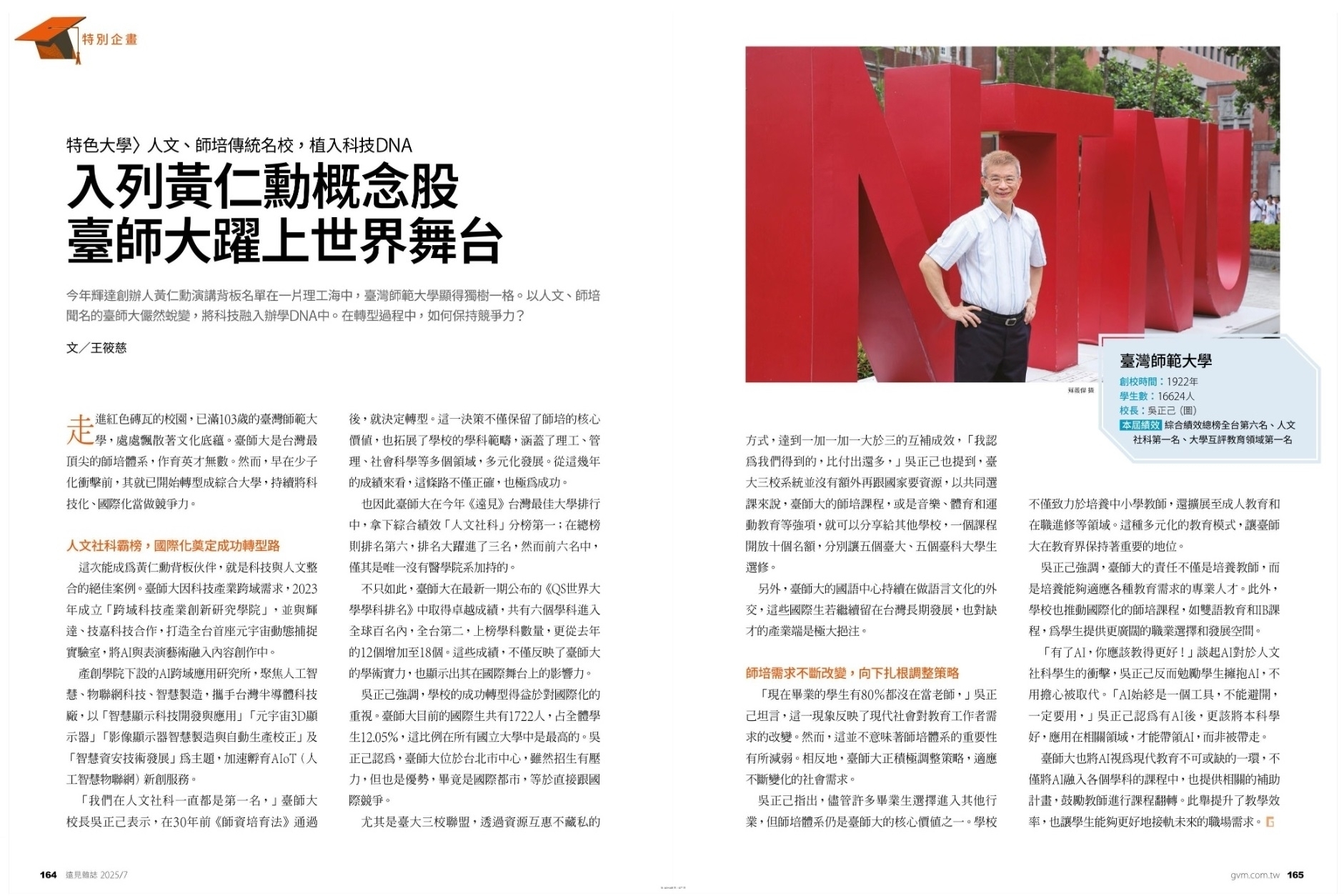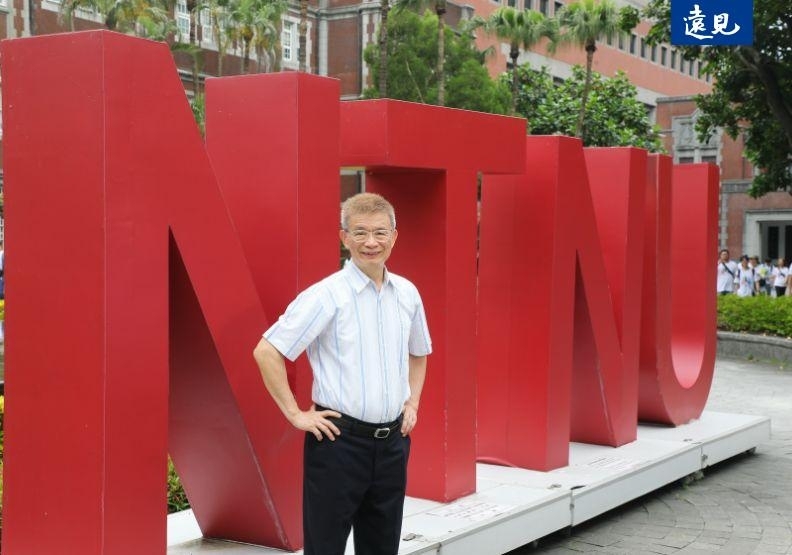NTNU Rises in Rankings Through Internationalization and Interdisciplinary Growth
On June 26, Global Views Monthly released its “2025 Taiwan Best Universities Rankings.” National Taiwan Normal University (NTNU) excelled in the “Overall Performance Ranking,” climbing three places to sixth nationwide. The achievement reflects the school’s determination to reinvent itself as an international, comprehensive university. For the eighth consecutive year, NTNU also ranked first in the “Humanities and Social Sciences University” category, affirming both its traditional strengths in the humanities and its growing commitment to cross-disciplinary innovation.
In a special July issue, Global Views Monthly featured NTNU President Cheng-Chih Wu in a cover story titled 2025 Best Universities Ranking: Included in Jensen Huang’s Concept Stocks, National Taiwan Normal University Steps onto the World Stage. Bright Lee, Chief Editor of Research, and Hsiao-Tse Wang, Editor-in-Chief, underscored NTNU’s unique position: it is the only university among Taiwan’s top six without a medical school, making its rise in the rankings especially notable.
The article emphasized NTNU’s integration of technology into its mission, identifying technological advancement and internationalization as its competitive edge. This transformation marks NTNU’s evolution from a traditional teacher-training institution into a globally engaged comprehensive university.
A translated version of the article from Global Views Monthly is excerpted below:
Included in Jensen Huang’s Concept Stocks
National Taiwan Normal University Steps onto the World Stage
Humanities Strength Infused with Technology DNA
In his annual address, Nvidia founder Jensen Huang cited NTNU, long known as a humanities-centered institution, alongside a roster dominated by STEM universities. The recognition highlighted NTNU’s ability to incorporate technology into its identity while retaining its heritage in teacher education and the humanities.
Its 103-year-old red-brick campus remains a symbol of cultural continuity, but demographic changes prompted NTNU to begin its transformation early, placing technology and internationalization at the center of its long-term strategy.
In 2023, the university established the College of Interdisciplinary Industry-Academia Innovation (CIAI), launching Taiwan’s first Metaverse Motion Capture Laboratory in collaboration with NVIDIA and GIGABYTE. The initiative links AI and the performing arts, opening new avenues for content creation. Within CIAI, the Graduate Institute of AI Interdisciplinary Applied Technology works with Taiwan’s semiconductor industry on projects in smart displays, metaverse visualization, automated calibration, and cybersecurity. These areas are critical to the growth of the AIoT (Artificial Intelligence of Things).
President Wu reflected: “We have always led in the humanities and social sciences. After the Teacher Education Act was passed 30 years ago, we resolved to transform.” That reform preserved NTNU’s core strengths in teacher education while expanding into science and engineering, management, and social sciences, creating a more balanced university.
This year, NTNU again ranked first in Humanities and Social Sciences and sixth overall in Taiwan. It also performed strongly in the QS World University Rankings by Subject, with six disciplines in the global top 100, second only to one other Taiwanese university. The number of ranked subjects jumped from 12 to 18 in a single year, underscoring NTNU’s expanding international visibility.
Internationalization as a Driving Force
According to Wu, internationalization has been central to NTNU’s transformation. The university now hosts 1,722 international students, or12 percent of its enrollment, which is the highest proportion among Taiwan’s national universities. While its central Taipei location poses challenges, it also offers unparalleled opportunities for global engagement.
The “National Taiwan University System,” comprising NTU, NTNU, and NTUST, further boosts competitiveness through shared resources. NTNU’s expertise in teacher education, music, physical education, and sports science strengthens the alliance.
Meanwhile, NTNU’s Mandarin Training Center (MTC) continues to serve as a pillar of cultural diplomacy. Founded in 1956, it is the world’s largest and most influential Chinese-language center, enrolling more than 1,700 students from over 80 countries each term. Its alumni include diplomats and national leaders. Recent innovations such as the “COOL Chinese” online platform and the “SmartWriting (AES-HAN)” essay evaluation system have expanded its reach to nearly 70,000 learners worldwide. Through the Ministry of Education’s “Huayu BEST” program, the MTC has also built partnerships with leading U.S. universities including UCLA and Purdue.
Teacher Education in Transition
Even as it broadens its scope, NTNU remains rooted in teacher training. “Today, 80 percent of our graduates do not become teachers,” Wu observed. “But that does not lessen the importance of teacher education.” Instead, the university has expanded into adult and continuing education as well as bilingual and International Baccalaureate training.
In 2021, the Ministry of Education selected NTNU as a lead institution for the “Bilingual Education for Students in Higher Education Program.” Since then, its English as a Medium of Instruction (EMI) offerings have surged by 78 percent, and half of all students now enroll in at least one EMI course. NTNU also established the Center for Academic Literacy, which develops EMI training modules in collaboration with the University of Texas at Austin and Columbia University.
Wu has also challenged students to see AI as a tool, not a threat. “With AI, you should teach better,” he said, urging them to master foundational subjects while leading in applications.
Innovation and Advanced Laboratories
NTNU has made AI integral across disciplines, incentivizing faculty to adopt new teaching methods and research applications. Several high-profile collaborations have resulted, including an energy management system developed with NeoPower Technologies that reduces electricity use by 6 to 34 percent; a near-infrared waste-sorting platform created with Pade Technology to support Taiwan’s circular economy goals; and the College of Arts’ Metaverse Motion Capture Laboratory (NVIDIA Studio x GIGABYTE Collaboration Space), which merges VR, motion capture, and AI for artistic exploration.
The university now hosts more than 20 advanced laboratories spanning science, engineering, and the arts. Facilities include a Laser Ablation Inductively Coupled Plasma Mass Spectrometer (LA-ICP-MS/MS) for high-precision chemical analysis and motion capture systems for sports science and media applications. The Research Center for Conservation of Cultural Relics (RCCCR) works with the École du Louvre and the National Palace Museum to apply advanced conservation methods to both Eastern and Western art. Together, these laboratories illustrate NTNU’s strategy of combining cutting-edge technology with the humanities and creative fields.
Balancing Local and Global
Even as it internationalizes, NTNU continues to cultivate teachers for primary, secondary, adult, and international education. Courses taught in local languages, from astronomy in Taiwanese to computer programming in Python, illustrate its dual mission: preserving cultural heritage while broadening academic horizons.
For Wu, NTNU’s evolution is not a departure but an expansion. By leading in the humanities while embracing technology and global partnerships, the university is positioning itself at the forefront of higher education in Taiwan and beyond.



